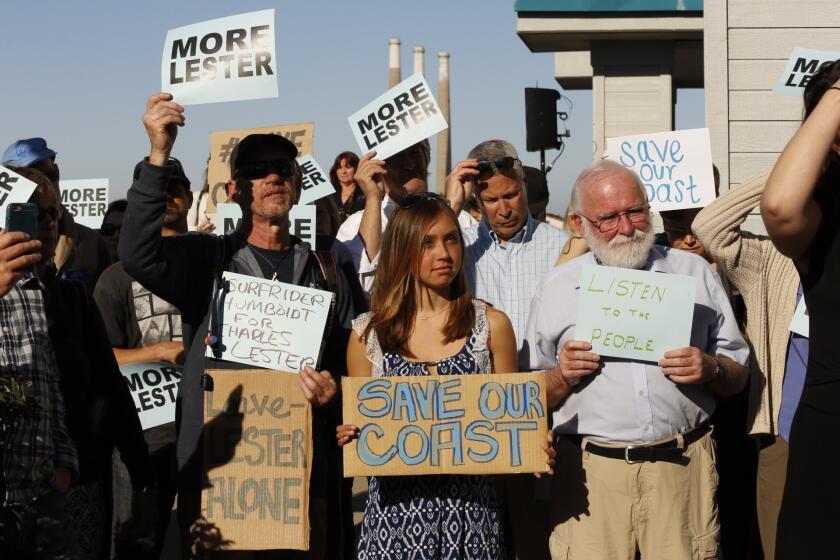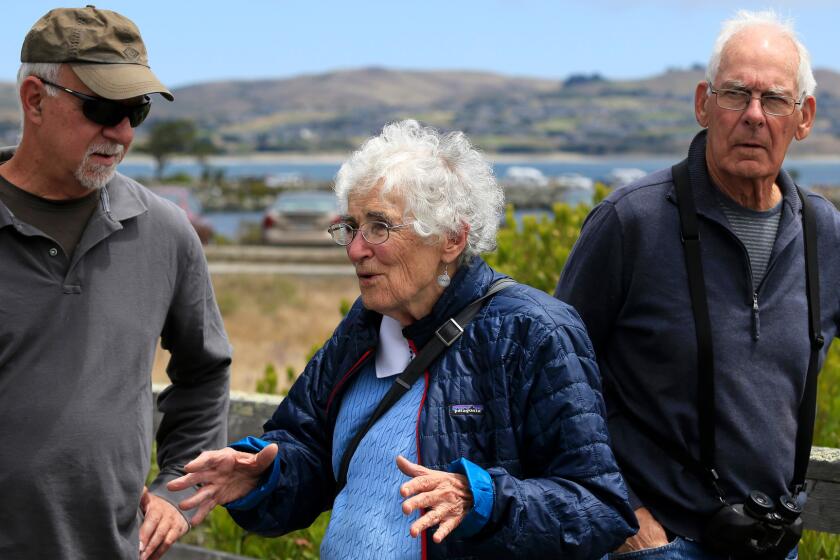For decades, she’s been the unsung hero of California’s coast
- Share via
When Californians dig their feet into the sand and marvel at a seascape uncluttered by Miami high-rises or a Jersey-like shore, some might know to thank the state’s hard-fought history of coastal protection.
A unique law, willed into existence by the people of California, declared decades ago that the coast is a public treasure that must be shared by all. Entrusted with this mission is an unusual government agency that has waged many epic battles against the state’s most powerful and wealthy.
One woman has been there since the very beginning.
Considered the heart and brains of the California Coastal Commission, Susan Hansch has kept the pulse of the agency beating for more than four decades. She is the lesser-known half to the one in charge, the longtime deputy to the numerous men who have taken the helm.
Have a question that can’t be answered? Ask Susan. Unsure about some arcane piece of legislation? Call Susan. She’s the gut check, the one who dots the I’s and catches all the blind spots. A firm but friendly force of reason, this petite second-in-command has stood up to some of the biggest oil companies and the most challenging controversies.
Now, at the end of the month, after 46 years at the commission, the agency’s longest-serving guardian of the coast is finally moving on. She tried to retire years ago, but there always seemed to be another crisis that could use her wise counsel.
“Susan is the most important person to the coast you’ve probably never heard of,” said Assemblyman Mark Stone (D-Scotts Valley), a former coastal commissioner. “She is absolutely the unsung hero of the coast.”
Hansch, 68, first fell in love with the California coast when she was in the seventh grade. Her father, a Navy man turned English teacher, was fed up with shoveling snow on their small farm in Illinois and moved their family to Gilroy, Calif. The eldest of four, Hansch remembers her mother making the 40-minute drive over the hill toward Santa Cruz and the sea.
On summer days when temperatures would break 100 degrees, a day by the ocean would bring so much joy. Every time she returned, the coast would amaze her in some new way — the waves would be different, the colors, the little shorebirds that emerged some days but not others.
By 1972, Hansch had joined a fervent movement to save the coast from an unimaginable future: Unchecked development, beaches controlled by the wealthy, devastating oil spills like the one in Santa Barbara that horrified all those who loved the shore.
While fellow classmates at UC Santa Cruz drummed up support with headline-grabbing tactics, Hansch, who was studying biology and environmental studies, busied herself with collecting signatures, paperwork and whatever else was needed to get a measure on the ballot that would safeguard the shore.
The scrappy brigade faced intense odds, with big developers and oil companies pouring immense power and money into fighting the voter initiative. But after months of phone calls and an impassioned call for action, the people of California approved Proposition 20. The coast, voters agreed, belongs to everyone.
Peter Douglas, the larger-than-life visionary whose name has become synonymous with coastal protection, got to work crafting the state’s Coastal Act. Signed into law in 1976, the legislation declares a bold set of principles that balance environmental protection and the interests of the people. It enshrined one of the nation’s most powerful land-use agencies: the California Coastal Commission.
“It’s such a beautiful piece of legislation,” said Hansch, who worked on the coastal plan as a volunteer, then a student assistant, for $3.03 an hour. “I was just like ‘Wow, this is amazing, the public cares about the coast enough to get this done.’”
Hansch’s sharp mind and dedication stood out, moving her quickly to junior staffer, then an analyst for the unit handling offshore oil issues. In 1985, Douglas, who had become the agency’s executive director, tapped Hansch to lead the energy unit — a position others assumed would be given to a man.
With her bright-colored blazers and Farrah Fawcett hair, she pushed through all the power plays, the lawsuits, the developers who hated being told what to do by a woman barely 5 feet tall. She led with a quiet intensity and took the bullets for the public at a time when the federal government sought to open almost the entire state’s coastline to oil drilling.
“I would be freaking out, we all felt so vulnerable, and Susan — Susan would just stay calm,” said Linda Krop, chief counsel at the Environmental Defense Center, a nonprofit based in Santa Barbara. “She did everything she could to uphold the integrity of the institution and to uphold its integrity in the eyes of the public.”
It was a challenging time for the commission, whose spirited independence faced the constant ire of those in power. Douglas held no punches in upholding the Coastal Act, and Gov. Jerry Brown infamously called the staff “bureaucratic thugs.”
When Gov. George Deukmejian came into office in the 1980s, he slashed the commission’s budget so much that half the staff had to be let go. In those same years (not unlike the most recent four), the Reagan administration tried to strip the agency’s power to block offshore oil operations in federal waters.
In the 1950s and 1960s, developers and urban planners had big ideas for the coast.
“We were totally under assault,” said Mark Delaplaine, who joined the commission in 1976 and retired last year. “The battles that we fought in the early days taught us so much. It explains how Susan was able to accomplish a lot of the later things … She’s got a lot of courage and determination and Jesus, a lot of stamina.”
After a particularly tense meeting with a big utility company, Hansch remembered Douglas giving her some tough love on how to survive this male-dominated world:
“You can be strong, you can be forceful, but don’t let your emotion show. You’ll lose your power,” she recalled him saying.
So she armed herself with facts, not fervency. Douglas, whom she misses every day, persuaded her in 1999 to become his chief deputy. The first woman to take on this role, she now manages a staff of 182 people with a warmth that she wished her younger self had known how to balance.
Through the long days and towering stacks of budget papers, she still remembers birthdays and makes time to personally pick up an intern from the airport. Many notice how much heart she puts into training a new and diverse generation of coastal guardians, and today, a striking number of women are calling the shots at the commission.
“Susan has been such a key force and key advocate for environmental justice and pursuing racial equity,” said Sumi Selvaraj, who was recruited by Hansch in 2015 as a graduate student and is now the agency’s environmental justice manager. “She has a good way of identifying people’s strengths and helping them realize their potential … She’s like the commission mom.”
All week long, the ultimate destination was the Sonoma County coast.
The agency is indeed family. Her daughter, Rachel Wright, remembers coloring in the corner of Hansch’s office as a little kid and speaks today of commission staff like they’re dear aunts and uncles. Her mother quietly found a way to do it all, she said, whether it’s spending a day at the tide pools teaching her the scientific names of all the sea animals, picking up trash on the beach, completing a master’s degree on weekends or rushing to the local university after work for a leadership coaching program.
The antidote to exhaustion, after all, is not necessarily rest, one of her favorite poets once wrote.
The antidote to exhaustion is wholeheartedness.
“I find it pretty amazing how much of herself she gives to everybody. She works 12-hour days … and then she comes home, she’ll have dinner, and then she wants to talk about all of our days,” Wright said. “She also has like a million friends that she keeps up with all the time.”
Hansch’s husband, Richard Wright, laughed when asked if he’d known he was marrying the coastal commission. He speaks of his wife with a tender admiration.
“What’s the goal? Save the coast,” said Wright, a CPA who shares Hansch’s love for scuba diving and hiking across different parts of the world. “It has always been a quiet passion of: What is the best for the coast?”
That goal has been tested over the years, through the whiplash of different administrations and hundreds of commissioners — the decision-making half of the agency. Appointed by the governor and state legislative leaders, these voting members occasionally challenge staff and come with their own agendas. One commissioner was sentenced to jail for soliciting bribes.
Hansch also guided staff through the darkest of times: the political pressures to fire Douglas, losing their beloved leader in 2012 to cancer, then the dramatic firing of his recommended successor, Charles Lester, which many saw as a power move against an agency that fiercely answered to no one but the Coastal Act.
“She has been our rock and our guiding light,” said Jack Ainsworth, who was appointed executive director in 2017 amid the turmoil.
She took care of not just the agency, but also the public — devoting time to education programs that inspire more people to understand the pressing issues of today. She oversaw the publishing of a number of books filled with coastal history, maps and beach access points along the state’s more than 1,200-mile shore.
Not one to sit still, she has also personally worked on sea level rise adaptation and other complex issues that loom ever larger over the coast.
In a tribute in December that brought commissioners to tears, Ainsworth held up a box of tissues as he announced Hansch’s retirement. His voice cracked: “How do you thank someone for 46 years of service and sacrifice for the protection of our coast and ocean?”
Hansch has not quite processed that she’s leaving. She feels good about the people at the commission today — they remind her of the young, mission-driven cadre she first joined in the 1970s.
There were no computers in those early days, she recalled. Reports were literally cut and pasted together. Now she’s retiring at a time when even the goodbyes must be said virtually as the pandemic rages on.
Looking forward, she has already volunteered to support the eight employees who have been reassigned to COVID-19 contact tracing (the state has asked almost every agency to dedicate 5% of staff to this heartbreaking task).
With climate change looming as “the existential issue that will shape all else,” Hansch hopes the commission will continue to find ways to protect what coastal habitats are left — and ensure that access to the shore is truly equitable to all.
She paused. The reality sinks in as she ponders how else to fill her newfound time.
The words of another favorite poet, Mary Oliver, come to mind — words that have guided younger staff over the years as she brought them on board. Her eyes crinkle into a smile. It’s now her turn to answer this question anew:
Tell me, what is it you plan to do
with your one wild and precious life?
More to Read
Sign up for Essential California
The most important California stories and recommendations in your inbox every morning.
You may occasionally receive promotional content from the Los Angeles Times.













